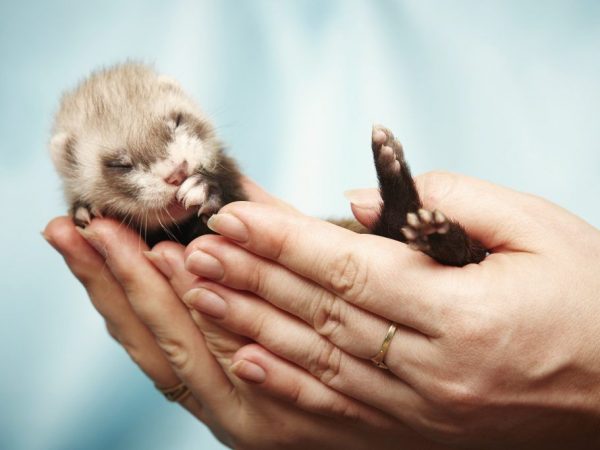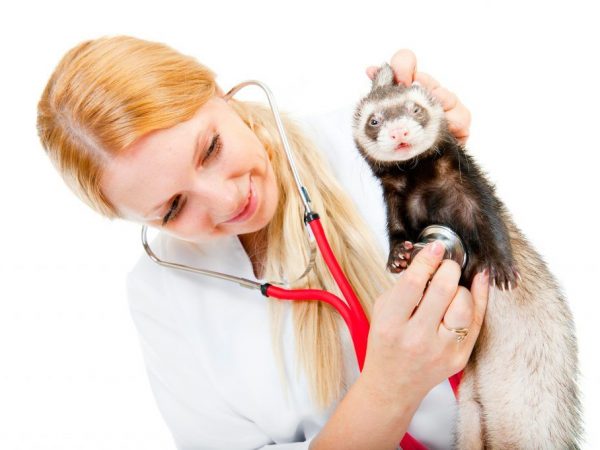Diseases in ornamental ferrets
Diseases of pets are always stressful for their owner. Rabies in ferrets or severe diarrhea that does not stop for days - any ailment needs urgent medical treatment.

Diseases of ornamental ferrets
More complex diseases, such as insulinoma in a ferret or tumors, threaten not only the health of the pet, but also his life. Helping the animal is the primary task of its owner. What ferret diseases can be cured at home?
Dangerous diseases in a decorative ferret
Often, keeping active animals is associated with problems and various diseases. The immunity of animals kept at home is weak, and their body is susceptible to constant viral and infectious diseases. It happens that the paraanal glands in the ferret become very inflamed or the estrus does not end in due time. In no case should such changes in the body of animals be ignored.
Ferret diarrhea is a common occurrence and does not always indicate serious internal organ abnormalities. Loose stools can be a separate symptom or a consequence of the animal's malnutrition. Unwashed feeders or dirty water in the drinker will cause your pet to have diarrhea or symptoms of food poisoning. Careful pet care and testing of feed, water and vitamins will help to avoid serious health consequences for pets.
The main symptoms and treatment will determine how quickly the ferret will recover from the illness.
Worms are another problem that plagues animals of all ages. Helminth eggs enter the animal's body through food, water, and contact with the environment. Diseases in ferrets associated with parasites are treated with special anthelmintic drugs. Effective drugs can only be prescribed by a veterinarian.
There are cases when the animal is annoyed by cystitis. It will be possible to cure the inflammation of the ferret's bladder only through careful caring for the animal and arranging its bed (warming an old hammock or replacing it with a new house).

The owner needs to take good care of his pet
The tick is found in animals living in dirty cages. The tick itself is dangerous only with prolonged contact with the skin and mucous membranes of the animal. The parasite feeds on blood and at the same time releases hazardous substances into the pet's bloodstream. If the tick feeds from the host for a long time, the ferret will experience weakness and persistent illness.
Animals suffer from ear infections in the cold season or in apartments with constant drafts. Treatment for viral diseases or ear infections is carried out in several stages, and further prevention allows you to protect your pet's health from relapses of the disease or their consequences. How to treat your pet at home?
Rabies and plague
Symptoms of the disease are warning signs that cannot be ignored.The pet is not able to formulate complaints, therefore, the observation and attention of a person will help save the animal before the manifestation of fatal complications.
Rabies is a threat to the life of both young animals and old pets. Rabies first affects the central nervous system.
The main symptoms of the disease:
- impaired coordination of movement of the ferret, confused behavior;
- aggressiveness;
- increased salivation.
The incubation period of the disease is from 1 to 3 months, but in some cases, rabies can manifest itself within a few weeks after infection. No medications help a sick animal, and there is no cure for rabies. On the 5th day after the manifestation of the first acute symptoms, the animal dies.
The only way to keep your ferret safe is through regular prophylaxis. It is based on timely vaccination. Animal care begins long before the first symptoms appear. A serious illness with a fatal outcome threatens all household members, therefore a sick animal must be isolated and ensured peace of mind.
Another contagious disease - plague - affects pets, but not in all cases leads to death. First, the plague affects the animal's respiratory tract, and then its entire digestive system. A pet can become infected only through contact with a sick living being. In the last stages, the disease affects the central nervous system, so the plague becomes pronounced and noticeable. It is possible to become infected with the disease by airborne droplets, so the sick animal must be urgently isolated. Young ferrets with weak defense mechanisms are more susceptible to plague.
The incubation period for plague is no more than a month. The first symptom is loss of appetite and fever. The external manifestations of a dangerous disease resemble a severe cold with conjunctivitis in the eyes.
Without treatment, the death of a pet occurs within 2 weeks. It is possible to try to save the animal only at the initial stage, after which the animals have no chance to cope with the disease. The optimal way out is timely vaccination and strengthening of the pet's immune system.
Influenza and infectious diseases
Influenza that affects humans can also harm ferrets. Even proper care of a pet will not protect it from viral diseases. If there are several animals in the house at once, they can easily become infected with one disease transmitted by airborne droplets.
The incubation period for influenza is exactly one week. The first signs of infection are as follows:
- fever and chills (body temperature rises to 40 ° C);
- in the initial stages, nasal discharge appears and appetite decreases;
- a sick animal becomes weak, constantly sleeps and practically does not eat anything;
- loose stools;
- pneumonia as a major complication of untreated influenza.

Ferret infectious diseases
The symptomatology is similar to the manifestation of influenza in humans. The animal is constantly freezing and tries to hide in a hammock.
A viral disease completely weakens the immune system of ferrets, therefore, against the background of influenza, the animal can develop various respiratory tract infections. Pneumonia, rhinitis and bronchitis are common complications.
Viral infections look similar, and the pet owner will not be able to distinguish rhinitis from pneumonia. The necessary examination will be carried out only by a veterinarian who will prescribe further effective treatment.
The first step for a sick animal is to equip it in a calm, warm and quiet place. Only high-quality food, water, vitamins should be put in the feeder and drinkers. If a couple of days of calmness does not help the ferret, a medication course of treatment is prescribed by the veterinarian.
Inflammation of the anal glands
Ferrets have two glands located on either side of the anus. As soon as the animal leaves feces, a certain secret is secreted from the glands.The substance has an unpleasant odor that drives away rivals. The secret helps the animal to empty and mark territory. Ferrets' diseases associated with malfunctioning of one gland lead to a strong inflammatory process. If too thick secretion comes out of the glands, obstruction of the gland occurs and the penetration of various infections into the body.
Inflammation of the paraanal glands in ferrets is quite common, especially in individuals with low immunity and weak defense mechanisms. The inflammatory process without treatment leads to the formation of abscesses. Removal of the paraanal glands in a ferret is an extreme measure, which veterinarians resort to only in animals with an advanced form of the disease. Inflammation threatens the health of a young animal.
Ferrets with inflamed glands develop foul-smelling pus around the anus. Removing the paraanal glands in a ferret does not always help, especially in cases where several infections have entered the pet's body at once. Negative changes in the body of ferrets (inflammation, discharge and ulcers formed near the diseased gland) are accompanied by severe pain. If the abscess opens, it will not be possible to avoid the consequences for the animal.
Obstruction of the paraanal glands manifests itself in the following symptoms:
- pet anxiety (the animal is constantly itching);
- decreased appetite;
- painful appearance;
- loose stools;
- purulent discharge.
Pus and stagnant secretions accumulate near the damaged paraanal glands, which causes the healthy mucous membrane around the anus to suffer. As a result, inflammation, wounds and ulcers. Open wounds near the gland (from the paraanal glands) are a favorable environment for the penetration of secondary infections and pathogenic microorganisms into the body.
An adult or young ferret can develop inflammation of the paranasal canals at any time of the year. A course of antibiotics will reduce the swelling of the gland and soothe the ulcers. The resulting pus is carefully removed twice a day. Damage to the directly paraanal channels is of great importance. If the drug course does not help, the glands must be removed.
Treatment for Aleutian ferret disease or inflammation of the ducts near the anus gives positive results only in the initial stages of the disease. Removal of affected organs or parts of the body of animals is an urgent and necessary measure that does not need to be brought up.
Malignant tumors
Ferrets also often experience cancer symptoms. Medical examinations find neoplasms in every third pet.
Lymphomas and other malignancies can occur in both young animals and adult ferrets. At the very beginning, the disease is completely asymptomatic. An unpleasant and dangerous process can take place in the body of an animal for several months. Only a complete examination of the animal's body and blood tests will make it possible to make an accurate diagnosis. It is ineffective to self-diagnose a pet at home. What to do if your pet has lymphoma?
Treatment of animals from tumors consists in excision of the formation. Removal of several neoplasms at once is not carried out. Treatment of cancer in the later stages is also not carried out. The use of hormones shows good results and excludes frequent relapses. If removal of the tumor is not prescribed, and medications do not help, the person's task is to provide the animal with peace of mind and care in the last days of life.
Another type of cancer - insulinoma - threatens adult pets. Both males and females suffer from this disease. For the treatment of insulinoma, medical and surgical methods are used. With the help of drugs, it is possible to slow down the growth of the tumor and alleviate the condition of the animal.
Conclusion
Any diseases in domestic ferrets are the result of the owner's inattentive attitude towards them.Their treatment should be carried out right on time and after talking with the veterinarian, otherwise you can lose your pet.


